The threat of an unprecedented clash between church and state over the issue of gay marriage has opened up after the Church of England delivered an uncompromising warning to the government against pressing ahead with controversial proposals.
Introducing same-sex marriage could lead to the church being forced out of its role of conducting weddings on behalf of the state, the church claimed in a potentially explosive submission in response to the government's consultation on gay marriage, which closes on Thursday.
The submission's warning of a potential clash between canon law – that marriage is between a man and a woman – and parliament is likely to put pressure on the prime minister, David Cameron, who has spoken out in support of gay marriage and already come under fire from supporters of the proposals for allowing a free vote amongst Tory MPs.
In a 13-page submission, the church says it cannot support the proposal to enable all couples, regardless of their gender, to have a civil marriage ceremony.
"Such a move would alter the intrinsic nature of marriage as the union of a man and a woman, as enshrined in human institutions throughout history," it says.
"Marriage benefits society in many ways, not only by promoting mutuality and fidelity, but also by acknowledging an underlying biological complementarity which, for many, includes the possibility of procreation."
The controversy comes at a particularly delicate time for the church itself, which is in the middle of a process that will choose a new Archbishop of Canterbury later this year to replace Dr Rowan Williams.
Internal debates on gay rights have been particularly heated during his tenure as he struggled to balance the CofE's own factions at the same time as holding together the disparate worldwide Anglican communion of 80 million members.
The church's submission warns that despite ministerial assurances that churches would not have to conduct gay marriages, it would be "very doubtful" whether limiting same-sex couples to non-religious ceremonies would withstand a challenge at the European court of human rights.
This could make it impossible for the CofE to continue its role conducting marriages on behalf of the state, it warned.
Under the current law, anyone who is resident in England has a legal right to marry in his or her CofE parish church irrespective of religious affiliation. Around a quarter of weddings in England take place in CofE churches.
The church position as set out in the submission, which notes the CofE's "unique position" in relation to the performing of marriage ceremonies, potentially raises the prospect of the biggest rupture between the state and the Church of England since it became the established church 500 years ago.
It claims the proposals would redefine institution of marriage in English law, warning: "At the very least that raises new and as yet unexplored questions about the implications for the current duties which English law imposes on clergy of the Established Church."
Complaining that several "major elements" of the government's proposals had not been thought through and were not legally "sound", the church said introducing gay marriage could also lead to challenges to civil partnership law, as removing the concept of gender from marriage while leaving it in place for civil partnerships would be unlikely to be "legally sustainable".
The Rt Rev Tim Stevens, Bishop of Leicester, said the CofE had been supportive of civil partnerships when the legislation was introduced eight years ago.
But he added: "I think the difficulty we have here is the substitution of equality for uniformity, that is to say that there can be no distinction at all between men and women. The government is seeking to meet what it perceives to be the needs of the gay community. I would say that the Church of England is sympathetic to those needs, we want to see a society in which gay people are fully included and their needs are fully provided for.""But this does not amount to a basis for introducing a complete redefinition of the concept of marriage based on a consultation process which is at the very least rapid
"From a standing start within three months to arrive at a fully considered, weighed and articulated redefinition of a fundamental social institution which has been thought about in one particular way for centuries and which is broadly accepted as a social institution in the same way internationally - to change all that on the basis of a consultation like this seems to be at the very least unwise and ill considered."
The government has already been warned on the issue by the Archbishop of York, Dr John Sentamu, regarded as a serious contender to replace Dr Williams. The second most senior bishop in the Church of England said in January that legalising gay marriage would overturn centuries of tradition and that marriage should only be between men and women.
The church's submission came under fire from gay rights campaigners such as Peter Tatchell, who accused it of "scaremongering, exaggerating the effects of same-sex marriage and advocating legal discrimination".
He added: "The government's proposals concern only civil marriages in register offices. They will have no impact on faith organisations or places of worship. Senior churchmen are protesting against a law change that will not affect them.
"They have no right to demand that gay couples should be banned from civil marriage ceremonies."
Ben Summerskill, chief executive of Stonewall, which campaigns for gay rights, said: "There's manifestly no evidence that the recognition of long-term same-sex relationships has any impact on the institution of marriage for heterosexuals.
"It seems odd that the Church of England should be obsessing about a few thousand gay couples once again when there are currently 3 million children in Britain living in single-parent households."
A Home Office spokesman said: "The purpose of the equal civil marriage consultation is to enable us to listen to all views, including those of all religions.
"Marriage is one of the most important institutions we have. It binds us together, it brings stability, and it makes this country stronger. We have been clear that no religious organisation will be forced to conduct same-sex marriages as a result of our proposals.
"We welcome the Church of England's response and we will be carefully considering all points of view before publishing the outcome of the consultation later in the year."
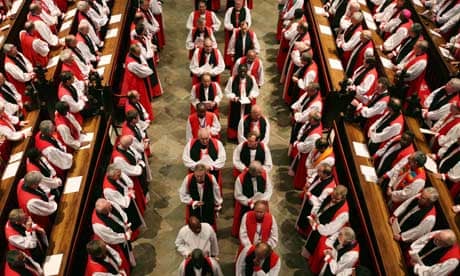
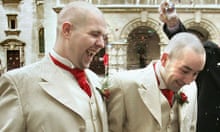
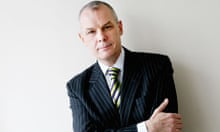
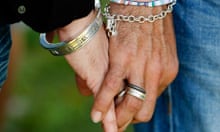
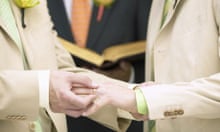
Comments (…)
Sign in or create your Guardian account to join the discussion